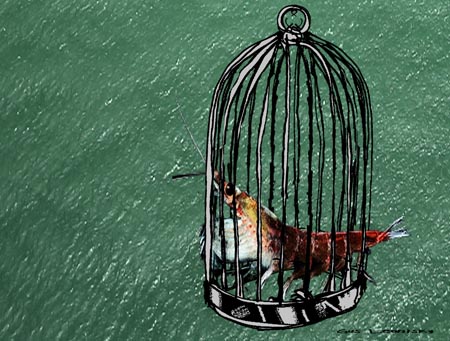Search
Recent comments
- help...
55 min 47 sec ago - APOLOGY....
1 hour 33 min ago - humanoids....
3 hours 34 min ago - refugees....
5 hours 34 min ago - tonight....
5 hours 44 min ago - 10 days?....
5 hours 54 min ago - MI6 parrot.....
6 hours 47 min ago - not sorry....
7 hours 12 min ago - trump's law.....
7 hours 20 min ago - confiscation....
8 hours 24 min ago
Democracy Links
Member's Off-site Blogs
no trills and thrils for krill...

A 20-year study shows worrying results about the decline of krill, a form of plankton, in the Southern Ocean.
Plankton is the basic food source for almost all ocean dwelling creatures and krill is one of its most important forms.
The scientist leading the krill project, Dr Graham Hosie, says he cannot explain the drop in numbers.
But Dr Hosie says he is hoping to get some answers from the latest scientific expedition to Antarctica, which departs from Hobart today.
About 90 scientists and support staff have boarded the research ship Aurora Australis.
The ship will be towing a small device that will hopefully unravel a mystery that is plaguing scientists. Its job will be to trap as many microscopic plankton as possible.
"It actually is fairly basic," Dr Hosie said.
"It's 1931 technology. It traps plankton between two sheets of silk. And we come back and we unroll those sets of silk, cut them up into five nautical mile sections and count everything that's on the silk."
Dr Hosie has been studying plankton for the past 20 years and he says they are essential to life.
Lately, Dr Hosie says he has been finding less of the organisms and it is a troubling decline he cannot explain.
"I like to think of it like the old coal miner's canary," he said.
http://www.abc.net.au/news/stories/2010/10/21/3044802.htm?section=justin
- By Gus Leonisky at 21 Oct 2010 - 5:52pm
- Gus Leonisky's blog
- Login or register to post comments
the Southern Ocean is changing
"One of the difficulties is that the plankton in the Antarctic are much better at identifying or relating themselves to their environment than we can identify," he said.
"That's still our task to work out what those changes are or what they mean and what might be driving them.
"Suffice to say that it keeps me fairly busy once the ships come back, trying to tease out that information.
"The plankton are telling us something and I've got to try and work out what that is."
Dr Hosie's study is one of 80 scientific projects being done in Antarctica this summer.
Ecologist Colin Southwell is planning to tag snow petrels to find out where the birds forage for food during the winter.
"We know that the Southern Ocean is changing," he said.
"We don't know very well how much that is influencing the biological part of the system.
http://www.abc.net.au/news/stories/2010/10/21/3044802.htm?section=justin